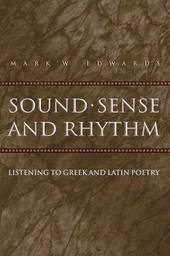
|
Sound, Sense, and Rhythm: Listening to Greek and Latin Poetry
Paperback / softback
Main Details
| Title |
Sound, Sense, and Rhythm: Listening to Greek and Latin Poetry
|
| Authors and Contributors |
By (author) Mark W. Edwards
|
| Series | Martin Classical Lectures |
|---|
| Physical Properties |
| Format:Paperback / softback | | Pages:208 | | Dimensions(mm): Height 235,Width 152 |
|
| Category/Genre | Literary studies - classical, early and medieval
Literary studies - poetry and poets |
|---|
| ISBN/Barcode |
9780691117843
|
| Classifications | Dewey:881.109 |
|---|
| Audience | | Professional & Vocational | | Tertiary Education (US: College) | |
|---|
|
Publishing Details |
| Publisher |
Princeton University Press
|
| Imprint |
Princeton University Press
|
| Publication Date |
25 January 2004 |
| Publication Country |
United States
|
Description
This book concerns the way we read or rather, imagine we are listening to - ancient Greek and Latin poetry. Mark Edwards shows how an understanding of the effects of word order and meter is vital for appreciating the meaning of classical poetry, composed for listening audiences. This study will enrich the appreciation of classicists and their students for the immense possibilities of the languages they read, translate, and teach. Since the Greek and Latin quotations are translated into English, it will also be welcomed by non-classicists as an aid to understanding the enormous influence of ancient Greek and Latin poetry on modern Western literature.
Author Biography
Mark W. Edwards is Emeritus Professor of Classics at Stanford University. He is the author of "Homer: Poet of the Iliad" and Volume 5 of "The Iliad: A Commentary".
Reviews"If by this book [Edwards] succeeds in heightening sensitivity to the features which he seeks to recuperate, he will indeed have done good service to his peers and successors ... and have given renewed hope for the continued vitality of ancient Greek and Latin literature."--Michael W. Haslam, Bryn Mawr Classical Review "This lively and often fascinating exposition of the sound of ancient poetry and its relation to sense and meaning, especially as perceived by the listening audience, is relevant to anyone who tries to understand ancient literature in context... [T]his book is enlightening for both scholars and general readers of the classics, indeed for those interested in the relation between sound and sense in any literature and for lovers of the poetry of any culture."--Jonathan J. Price, Religious Studies Review
|